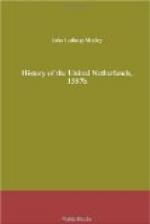“Sir William Stanley, by you appointed governor of Deventer, and Rowland York, governor of Fort Zutphen, have refused, by virtue of that secret document, to acknowledge any authority in this country. And notwithstanding that since your departure they and their soldiers have been supported at our expense, and had just received a full month’s pay from the States, they have traitorously and villainously delivered the city and the fortress to the enemy, with a declaration made by Stanley that he did the deed to ease his conscience, and to render to the King of Spain the city which of right was belonging to him. And this is a crime so dishonourable, scandalous, ruinous, and treasonable, as that, during this, whole war, we have never seen the like. And we are now, in daily fear lest the English commanders in Bergen-op-Zoom, Ostend, and other cities, should commit the same crime. And although we fully suspected the designs of Stanley and York, yet your Excellency’s secret document had deprived us of the power to act.
“We doubt not that her Majesty and your Excellency will think this strange language. But we can assure you, that we too think it strange and grievous that those places should have been confided to such men, against our repeated remonstrances, and that, moreover, this very Stanley should have been recommended by your Excellency for general of all the forces. And although we had many just and grave reasons for opposing your administration—even as our ancestors were often wont to rise against the sovereigns of the country—we have, nevertheless, patiently suffered for a long time, in order not to diminish your authority, which we deemed so important to our welfare, and in the hope that you would at last be moved by the perilous condition of the commonwealth, and awake to the artifices of your advisers.
“But at last-feeling that the existence of the state can no longer be preserved without proper authority, and that the whole community is full of emotion and distrust, on account of these great treasons—we, the States-General, as well as the States-Provincial, have felt constrained to establish such a government as we deem meet for the emergency. And of this we think proper to apprize your Excellency.”
He then expressed the conviction that all these evil deeds had been accomplished against the intentions of the Earl and the English government, and requested his Excellency so to deal with her Majesty that the contingent of horse and foot hitherto accorded by her “might be maintained in good order, and in better pay.”
Here, then, was substantial choleric phraseology, as good plain speaking as her Majesty had just been employing, and with quite as sufficient cause. Here was no pleasant diplomatic fencing, but straightforward vigorous thrusts. It was no wonder that poor Wilkes should have thought the letter “too sharp,” when he heard it read in the assembly, and that he should have done his best to prevent it from being




